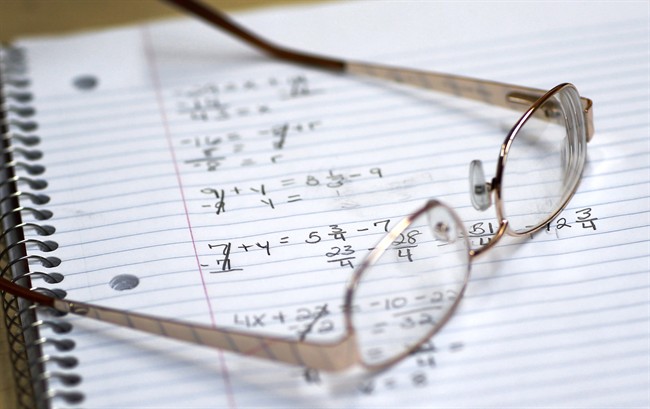TORONTO — Helping your kids with their math homework could be doing more harm than good if it makes you anxious.

As much as you may try to hide it, kids can pick up on your anxiety level and internalize it, according to a recent study published in the Psychological Science journal. The study assessed more than 400 Grade 1 and 2 students in math achievement and anxiety both at the beginning and end of the school year.
Parents were given a questionnaire which asked about their own math anxiety and how often they worked with their kids on math.
“Our work suggests that if a parent is walking around saying ‘Oh, I don’t like math’ or ‘This stuff makes me nervous,’ kids pick up on this messaging and it affects their success,” said University of Chicago psychological scientist Sian Beilock, who helped lead the study.
READ MORE: Is discovery-based learning hurting Canadian math scores?
She and her team found that children whose math anxious parents tried to help them actually learned less math over the school year, and were more likely to be math-anxious themselves — but only when they received frequent math homework help from their math anxious parents.
That’s led researchers to believe the link between parents’ math anxiety and children’s math performance stems more from the attitude around math than genetics.
“Math-anxious parents may be less effective in explaining math concepts to children, and may not respond well when children make a mistake or solve a problem in a novel way,” explained fellow researcher Susan Levine.
Lead study author Erin A. Maloney added that the way parents approach math help is key.
READ MORE: Parents across Canada fight for return to traditional math lessons
“We can’t just tell parents—especially those who are anxious about math—‘Get involved,’” Maloney explained. “We need to develop better tools to teach parents how to most effectively help their children with math.”
That may include math books, computer and traditional board games, or Internet apps that “allow parents to interact with their children around math in positive ways,” the researchers wrote.
READ MORE: New app helps students with math problems
Harris Cooper, a psychology and neuroscience professor at Duke University, made another suggestion in The New York Times:
“Tell your child, ‘You have your math homework, and I have mine,’ he said, and show them whenever you ‘count your change, calculate when dinner will be ready, look at prices in a grocery store.'”
If those mathematical equations also stress you out, well, maybe it’s time to just hire a tutor.


Comments